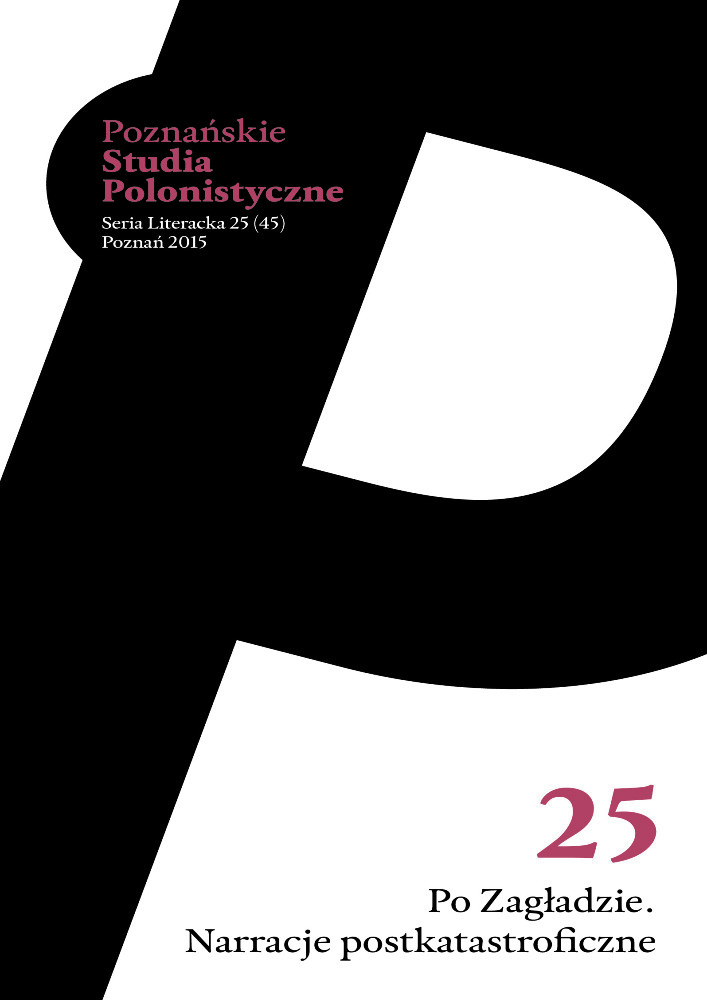Abstrakt
This essay addresses the instable meaning of the term catastrophe over the course of history. The first part takes leave of the “the tiny fissures” in the continuous catastrophe noted by Walter Benjamin to develop a philology of the cata/strophe. This philology does not only register a given meaning (for instance, of the catastrophe), but intervenes actively as disruption. It insists on the strophe in the catastrophe, transforming catastrophe into cata/strophe that, in fatal situations, permits the poetic potential to become a dynamic force that can, at least on the linguistic level, open toward other dimensions without denying the catastrophe itself. The second part is dedicated to a reading of Jorge Semprún’s autobiographical novel L’écriture ou la vie from the perspective of this philological concept. It seeks to show how Semprún’s citing and reciting of Baudelaire’s strophes in the putrid atmosphere of the Buchenwald concentration camp literally produce, on the level of the signifiers, fresh air to breathe.Finansowanie
Przeł. Katarzyna Adamczak.
Bibliografia
Adorno Theodor W. (1986), Dialektyka negatywna, przeł. Krystyna Krzemieniowa, PWN, Warszawa.
Adorno Theodor W. (1994), Teoria estetyczna, przeł. Krystyna Krzemieniowa, PWN, Warszawa.
Adorno Theodor W. (1999), Minima Moralia. Refleksje z poharatanego życia, przeł. Małgorzata Łukasiewicz, Wydawnictwo Literackie, Kraków.
Baudelaire Charles (1990), Kwiaty zła, wybór Maria Leśniewska, Jerzy Brzozowski, Wydawnictwo Literackie, Kraków.
Baudelaire Charles (2009), Arsenowi Houssaye, przeł. Ryszard Engelking, w: tegoż, Sztuczne raje, Słowo/Obraz Terytoria, Gdańsk, s. 165-166.
Benjamin Walter (1975), Park centralny, przeł. Hubert Orłowski, w: tegoż, Twórca jako wytwórca, Wydawnictwo Poznańskie, Poznań, s. 236-259.
Benjamin Walter (1980a), Fragmente vermischten Inhalts: Zur Sprachphilosophie und Erkenntniskritik, w: Gesammelte Schriften, t. VI, red. Rolf Tiedemann, Hermann Schweppenhäuser, Suhrkamp, Frankfurt am Main, s. 9-53.
Benjamin Walter (1980b), Anmerkungen zu: Über den Begriff der Geschichte, w: Gesammelte Schriften, t. I.3, red. Rolf Tiedemann, Hermann Schweppenhäuser, Suhrkamp, Frankfurt am Main, s. 1223-1266.
Benjamin Walter (2005), Pasaże, przeł. Ireneusz Kania, Wydawnictwo Literackie, Kraków.
Benjamin Walter (2012), O pojęciu historii, przeł. Adam Lipszyc, w: tegoż, Konstelacje. Wybór tekstów, Wydawnictwo UJ, Kraków, s. 311-323.
Briese Olaf, Timo Günther (2009), Katastrophe. Terminologische Vergangenheit, Gegenwart und Zukunft, „Archiv für Begriffsgeschichte”, z. 51, s. 155-195.
Celan Paul (2009), Przemowa bremeńska, przeł. Cezary Wodziński, „Przegląd Polityczny”, z. 97/98, s. 156.
Chantraine Pierre (1977), Dictionnaire étymologique de la langue grecque. Histoire des mots, t. 4.1, Klincksieck, Paris.
Diderot Denis (1962), Jacques le fataliste et son maître, w: OEuvres romanesques, red. Henri Bénac, Classiques Garnier, Paris, s. 493-780.
Diderot Denis (1987), Kubuś Fatalista i jego pan, przeł. Tadeusz Boy-Żeleński, Książka i Wiedza, Warszawa.
Felman Shoshana (1988), Die Lektürepraxis erneuern, w: Individualität, t. 13: Poetik und Hermeneutik , red. Manfred Frank, Anselm Haverkamp, Fink, München.
Helg Walter (1950), Das Chorlied der griechischen Tragödie in seinem Verhältnis zur Handlung, Buchdruckerei Oberwinterthur, Oberwinterthur.
Hobsbawm Eric J. (1999), Wiek skrajności: spojrzenie na krótkie dwudzieste stulecie, przeł. Julia Kalinowska-Król, Marcin Król, Politeja, Warszawa.
Hölderlin Friedrich (1988), Anmerkungen zum Oedipus, w: Sämtliche Werke, t. 16, red. Dietrich E. Sattler, Roter Stern, Frankfurt am Main, s. 247-258.
Kasper Judith (2014a), Für eine Philologie der Katastrophe, w: Unfälle der Sprache. Literarische und philologische Erkundungen der Katastrophe, red. Ottmar Ette, Judith Kasper, Turia + Kant, Wien, s. 7-20.
Kasper Judith (2014b), Kata/strophisches Lesen. Baudelaire in Buchenwald, w: Unfälle der Sprache. Literarische und philologische Erkundungen der Katastrophe, red. Ottmar Ette, Judith Kasper, Turia + Kant, Wien, s. 117-129.
Kayser Wolfgang (1946), Kleine deutsche Versschule, Francke, Bern.
Koppenfels Martin von (2000), Dante in-und auswendig. Primo Levis Gedächtnisfuge, „Poetica”, z. 32, s. 203-225.
Lacoue-Labarthe Philippe (2004), Poezja jako doświadczenie, przeł. Janusz Margański, Słowo/Obraz Terytoria, Gdańsk.
Levi Primo (2008), Czy to jest człowiek, przeł. Halszka Wiśniowska, Wydawnictwo Literackie, Kraków.
Nancy Jean-Luc (1988), Die undarstellbare Gemeinschaft, Schwarz, Stuttgart.
Nehring Johann Christoph (1690), Manuale Juridico-Politicum, Frankfurt.
Neuhofer Monika (2006), „Écrire un seul livre, sans cesse renouvelé.” Jorge Semprúns literarische Auseinandersetzung mit Buchenwald, Klostermann, Frankfurt am Main.
Nietzsche Fryderyk (1907), Narodziny tragedyi czyli hellenizm i pesymizm, przeł. Leopold Staff, Wydawnictwo Jakuba Mortkowicza, Warszawa.
Petitot-Cocorda Jean (1985), Les catastrophes de la parole. De Roman Jakobson à René Thom, Maloine, Paris.
Semprún Jorge (1994), L’écriture ou la vie, Gallimard, Paris.
Valéry Paul (1965), Prządka, przeł. Julian Rogoziński, w: Symboliści francuscy: od Baudelaire’a do Valéry’ego, red. Mieczysław Jastrun, Ossolineum, Wrocław.
Zedler Johann Heinrich (1733), Grosses vollständiges Universal-Lexicon aller Wissenschafften und Künste, t. 5, Halle.
Licencja
Autorzy
Autorzy tekstów przyjętych do publikacji w czasopiśmie „Poznańskie Studia Polonistyczne. Seria Literacka” są zobowiązani do wypełnienia, podpisania i odesłania na adres redakcji umowy o udzielenie nieodpłatnej licencji do utworów, z zobowiązaniem do udzielania sublicencji CC.
Zgodnie z umową, autorzy tekstów opublikowanych w czasopiśmie „Poznańskie Studia Polonistyczne. Seria Literacka” udzielają Uniwersytetowi im. Adama Mickiewicza w Poznaniu niewyłącznej i nieodpłatnej licencji oraz zezwalają na użycie sublicencji Creative Commons Attribution-NoDerivatives 4.0 International (CC BY-ND 4.0).
Autorzy zachowują prawa do dalszego, swobodnego rozporządzania utworem.
Użytkownicy
Zainteresowani użytkownicy internetu uprawnieni są do korzystania z utworów opublikowanych od 2016 roku w „Poznańskich Studiach Polonistycznych. Serii Literackiej” pod następującymi warunkami:
- uznanie autorstwa – obowiązek podania wraz z rozpowszechnionym utworem, informacji, o autorstwie, tytule, źródle (odnośniki do oryginalnego utworu, DOI) oraz samej licencji;
- bez tworzenia utworów zależnych – utwór musi być zachowany w oryginalnej postaci, nie można bez zgody twórcy rozpowszechniać np. tłumaczeń, opracowań.
Do wszystkich tekstów opublikowanych przed 2016 r. prawa autorskie są zastrzeżone.
Inne
Uniwersytet im. Adama Mickiewicza w Poznaniu zachowuje prawo do czasopisma jako całości (układ, forma graficzna, tytuł, projekt okładki, logo itp.).
